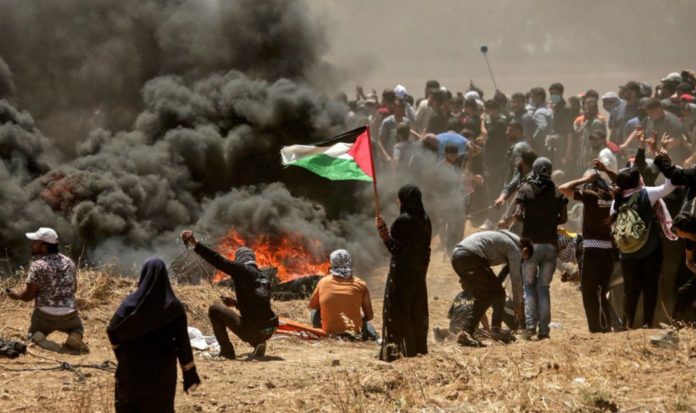The Israeli military said Thursday it was bolstering its forces along the Gaza border ahead of another expected explosive Hamas-orchestrated protest.
IDF Chief of Staff Lt.-General Gadi Eizenkott ordered the fortifications following an assessment of the border with Southern Command officers and representatives of the Shin Bet. He said additional measures were needed to “thwart terror activity and prevent infiltrations into Israel” before Friday’s near-weekly border protest that has routinely turned violent.
On Wednesday, soldiers along the border apprehended two infiltrators from Gaza who succeeded in entering southern Israel. One was armed with a knife.
Gaza’s Hamas rulers have staged the demonstrations since March to push for an end to the crippling Israeli-Egyptian blockade imposed after the Islamic terror group seized control of the coastal strip in 2007.
Over the past month, the protests have escalated as Egyptian-mediated cease-fire efforts have faltered, fueling fears of another war. Seven Palestinians, including two children, were killed last Friday, the deadliest day in nearly four months. Overall, Israeli troops have killed 145 Palestinians since March, including more than 30 children. A Gaza sniper killed an Israeli soldier in August.
Israel accuses the group, which is sworn to Israel’s destruction, of exploiting and endangering civilians by using them as cover for infiltration attempts and attacks against soldiers.
The Israeli military said it is “prepared for a wide range of scenarios and holds the Hamas terror organization accountable for all that happens in the Gaza Strip.”
In a rare interview with an Israeli newspaper, Hamas’s political leader Yahya Sinwar – who spent 22 years in Israeli prison for murder and was released seven years ago in the Shalit deal – acknowledged that an “explosion is inevitable,” but said “a new war is not in anybody’s interest.”
“Who wants to confront a nuclear power with our slingshots? You achieve nothing through war,” Sinwar told a Yediot Achronot.
He explains that he is interviewing in an Israeli newspaper because he feels that now there is a desire for change. While the confrontations on the Gaza border fence and the burning of the fields do not stop, and the tension on the border increases, Sinwar explains to the reporter that “I do not want any more wars, what I want is the end of the siege.”
He places the responsibility for the severe humanitarian situation of the residents of Gaza on Israel and says “The responsibility is that of the person who closed the borders, not of those who tried to reopen them. My responsibility is to cooperate with anyone who can help us put an end to the siege. All this at a time when 80% of the population in Gaza is receiving humanitarian assistance and 50% are hungry.”
Sinwar claims that some of the details in an agreement with Israel will include the return of bodies and civilians held by Hamas. “I will do everything to free anyone still held in prison” he concluded.
Palestinian President Mahmoud Abbas, who leads the rival Fatah movement in the West Bank, has no interest in helping Hamas, which ousted his forces in 2007, leaving the Palestinian people divided ever since. He’s halted salaries to thousands of former government workers in Gaza and ended fuel subsidies, all to step up pressure on Hamas.
It’s created a paradoxical situation in which Israel has faced resistance from Abbas to provide fuel and other essentials in Gaza to fend off a humanitarian disaster.
In a joint news conference with visiting German Chancellor Angel Merkel, Prime Minister Benjamin Netanyahu blamed Abbas for “the choking of Gaza right now which will, could lead to very difficult consequences.”
(AP / YWN Israel Desk – Jerusalem)











